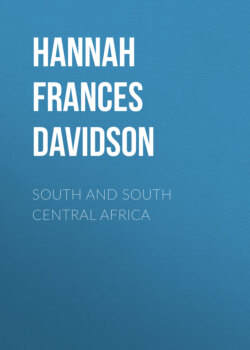Читать книгу South and South Central Africa - Hannah Frances Davidson - Страница 14
На сайте Литреса книга снята с продажи.
The Beginning of Missionary Effort
ОглавлениеTable of Contents
It was at the General Conference held in May, 1894, that the Foreign Missionary Work of the Church of the Brethren in Christ originated.
Previous to that time the old fathers of the church had made many missionary journeys through the United States and Canada for the advancement of Christ's Kingdom and in the interests of the faith they so dearly loved. These journeys were made without remuneration and often with great discomfort and sacrifice of time and money. The precept that the Gospel was free, "without money and without price," seemed so instilled into their hearts that some of them, no doubt, would have felt pained for people to think that they expected money for their services. So while the laity were busy with their own temporal duties, these heralds of the Cross would often leave their little farms in care of their wives and of help, hired at their own expense, and devote weeks and months to evangelistic work, expecting what? Nothing but their food and sometimes sufficient to pay their car fare, if they went by train. But it often happened in those early days that the entire expense of whatever sort was borne by themselves. They looked for no reward on earth save the consciousness that they were about their Master's business and seeking to extend His Kingdom on earth.
Much honor is due those old soldiers for their self-sacrificing labors. In that Great Day when the books are opened, perhaps the record of their labors may astonish some of us who sometimes criticise them for their slowness in launching the foreign missionary work of the Church.
Among them were some who were greatly burdened for the heathen. Some felt this lack of Church activity so keenly that they almost severed their connections with it on this account. Others saw the need, but, realizing the smallness of membership and the limited resources, thought the Church was too weak to launch out into foreign missionary enterprise.
In the meantime individual members were agitating the question, and some were planning to go independently to India and to Central America, while others were contemplating going under other Mission Boards.
While this agitation was going on, the question of foreign mission work was brought forward at the General Conference in May, 1894, held in the Bethel Church, Kansas. On Friday, the last day of the Conference, a paper on the subject was read by Mrs. Rhoda Lee, but no active steps were taken and the question was tabled indefinitely, to the great disappointment of some present. Later, on the same day, Elder J. E. Stauffer arose, and, placing a five-dollar bill on the table, stated that it was for foreign mission work, then sat down. This action brought matters to a crisis. Here was missionary money and something must be done with it.
After consultation it was decided that the donor be appointed Foreign Missionary Treasurer, and any desiring to donate should give their offerings to him; and that, as soon as sufficient money was in the treasury to justify the measure, active steps would be taken toward sending out missionaries. By the close of the day thirty-five dollars had been placed in the hands of the Treasurer. The funds increased slowly but steadily.
At the Conference of 1895 held in Ontario, "A Foreign Mission Board, consisting of Brethren Peter Steckly, B. T. Hoover, and J. E. Stauffer, was appointed to hold office for five years, subject, however, to the advice and control of General Council." At the next meeting of Conference in 1896 in Pennsylvania, "The Treasurer of the Foreign Mission Fund, J. E. Stauffer, submitted his report, and he was congratulated for his successful effort. The amount in the treasury is $419.60." This amount had been donated in two years. These data have been given that it may be seen how the work has grown.
At this meeting it was decided that the funds had increased sufficiently to take an advanced step. The Board was increased to twelve members with an operating board of three. Of this Elder Samuel Zook was appointed treasurer, Elder Henry Davidson, chairman, and Elder Jesse Engle, secretary. The Board was empowered to secure volunteers for starting a work among the heathen in some foreign country, no particular country being designated.
Of the General Board of twelve members, Brethren Peter Steckley, J. R. Zook, and Peter Climenhage are still on the Board after a lapse of eighteen years.
Just what was done in the interim I cannot say, but on January 15, 1897, there appeared in the Evangelical Visitor the following:
